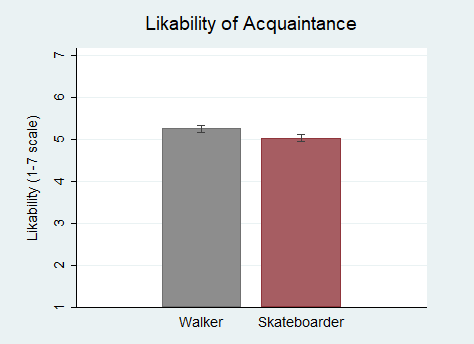Overview
Skateboarding has become a hot hobby amongst younger generations. In fact, 2020 marked the first year that skateboarding became an official sport in the Summer Olympics.
But perceptions of skateboarders have not always been so kind. In decades past, skateboarding was perceived to be associated with counterculture and crime (New York Times, 2004). Most urban planning prioritized other sports and facilities over skateparks. For example, although there are roughly 3 times as many tennis players as skateboarders in the U.S., there are roughly 80-90 times more tennis courts (Statista, 2021; StadiumTalk, 2021; New York Times, 2014).
But perhaps the growing popularity of skateboarding and it’s gradual acceptance by mainstream organizations like the International Olympic Committee have helped boost its image. It’s an interesting question. So, we tested Americans’ current perceptions of skateboarders with a simple experiment.
The Experiment
We recruited 400 people from Amazon Mechanical Turk to read a short vignette about an acquaintance who enjoys either walking or skateboarding (randomly assigned).
Participants were told “An acquaintance whom you just met, a man in his early 20s, has mentioned that he really enjoys [walking / skateboarding] to stay fit and have fun.” Participants were then asked, “How much do you like this person so far? (1 = Not at all, 7 = Very much)” using a 1-7 scale.
Note: We accidentally omitted the word “met” in our vignette, but since it was omitted across both conditions we do not believe it affected the results.
Results
An independent samples t-test revealed only a marginally significant difference in likability between our walker (avg. = 5.26) and skateboarder (avg. = 5.04), (p = 0.074). This difference was only borderline statistically significant and the standardized effect size was less than a fifth of a standard deviation, meaning that if a real difference exists, it is likely close to trivial. Furthermore, we found no significant interactions with participants’ age (p = 0.900), meaning that both older and younger people seem to view our skateboarding acquaintance about the same.
Skateboarding has become a hot hobby amongst younger generations. In fact, 2020 marked the first year that skateboarding became an official sport in the Summer Olympics.
But perceptions of skateboarders have not always been so kind. In decades past, skateboarding was perceived to be associated with counterculture and crime (New York Times, 2004). Most urban planning prioritized other sports and facilities over skateparks. For example, although there are roughly 3 times as many tennis players as skateboarders in the U.S., there are roughly 80-90 times more tennis courts (Statista, 2021; StadiumTalk, 2021; New York Times, 2014).
But perhaps the growing popularity of skateboarding and it’s gradual acceptance by mainstream organizations like the International Olympic Committee have helped boost its image. It’s an interesting question. So, we tested Americans’ current perceptions of skateboarders with a simple experiment.
The Experiment
We recruited 400 people from Amazon Mechanical Turk to read a short vignette about an acquaintance who enjoys either walking or skateboarding (randomly assigned).
Participants were told “An acquaintance whom you just met, a man in his early 20s, has mentioned that he really enjoys [walking / skateboarding] to stay fit and have fun.” Participants were then asked, “How much do you like this person so far? (1 = Not at all, 7 = Very much)” using a 1-7 scale.
Note: We accidentally omitted the word “met” in our vignette, but since it was omitted across both conditions we do not believe it affected the results.
Results
An independent samples t-test revealed only a marginally significant difference in likability between our walker (avg. = 5.26) and skateboarder (avg. = 5.04), (p = 0.074). This difference was only borderline statistically significant and the standardized effect size was less than a fifth of a standard deviation, meaning that if a real difference exists, it is likely close to trivial. Furthermore, we found no significant interactions with participants’ age (p = 0.900), meaning that both older and younger people seem to view our skateboarding acquaintance about the same.
Conclusion
So to answer our original question, there might still be a slight negative perception of skateboarding, but it seems to have improved quite a bit over the years. It’d be interesting to see what results we’d get 5 or 10 years from now, or if the U.S. ever wins gold in Olympic Skateboarding.
Methods Note
We used an independent samples t-test to test for significant differences in perceptions between our two experimental conditions. For significant differences, the difference between the two groups' averages would be large and its corresponding “p-value” would be small. If the p-value is less than 0.05, we consider the difference statistically significant, meaning we'd likely find a similar effect if we ran the study again with this population. To test for significant interactions between the main results and participant demographics, we used OLS regression analyses with interaction terms.
Methods Note
We used an independent samples t-test to test for significant differences in perceptions between our two experimental conditions. For significant differences, the difference between the two groups' averages would be large and its corresponding “p-value” would be small. If the p-value is less than 0.05, we consider the difference statistically significant, meaning we'd likely find a similar effect if we ran the study again with this population. To test for significant interactions between the main results and participant demographics, we used OLS regression analyses with interaction terms.
Popular Experiments
COVID MasksDoes wearing a COVID mask affect how others think of you?
|
Video GamesAre video games more enjoyable than board games?
Does age or gender matter? |
Zero-Sum PoliticsDo Democrats or Republicans view society as win-lose?
|




